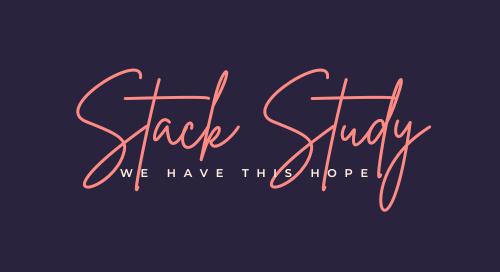3 Questions I Ask When I Read the Bible
And an invitation for you to use them starting this week...
I swear to you that I did not generate this title using AI.
I really do have 3 questions that I use when I study the Bible and I’m going to use this post to tell you what they are. You’re on the edge of your seat, I know.
The truth is when I sat down to write this, I realized its not nearly as amusing to me as the So I Won’t Forget Series or as engaging as telling someone else’s story for the podcast. Perhaps you felt the same way when this first graced your inbox, but I hope you’ll stick with me because what I actually have for you is an invitation, one that’s blossomed in my brain over the Advent season and that I pray will bear fruit for someone reading this.
Over the next few months, the dreariest ones that lead us all the way into the season of Lent, I’ll be releasing a free Bible study covering the books of Ezra & Nehemiah. It will all be hosted right here on Substack which means if you’re a subscriber, each lesson will come straight to your inbox with links to references, resources, and a few extras.
I cannot express to you how much I love these books. Historical narrative in the post-exilic period is STUNNING—there’s a sentence I never thought I’d say. While I’ve had the joy of teaching this to a group in my home and to a group at my church, I’ve always felt like there was another iteration in there somewhere—one that’s not limited by geography or a physically present teacher, but accessible for someone reading it on their phone at night while they nurse a baby or sitting in a car line waiting to pick up kids or up early before a day full of meetings or simply hungry for a little guidance on how to enter into these sometimes complex Biblical stories.
I promise you, if you’ll step into the map with me, the story of Ezra & Nehemiah will change you. You will think and feel things about the Biblical narrative that will follow you around during the day. You’ll want to talk to people about it. You’ll go down some rabbit holes in the best possible way and you’ll feel like an exile who is coming home.
Here’s what you need to know in a bullet point list because who doesn’t love a bullet point list:
I’ll release lessons on a weekly basis and we’ll be done by the first week of Lent (Ash Wednesday is March 5th). The first one comes out this week.
The study is free to anyone. Nothing would thrill me more than for you to extend this offering to a friend. Please invite someone to read along with you or use it with a small group.
All Scripture is hyperlinked within the lesson so you can read it entirely from your phone without having to jump around between a bunch of apps.
Additional resources will be at the end of each lesson because I want you to get sucked into the details with me AND to know where I got the information. Reach out if you have a question.
I’m working on a downloadable piece that you can print and use at a desk if that’s more your style. More to come on this soon!
And finally, let’s get to the whole reason you likely started reading this. I’m sharing the three questions I typically use as a guide when reading the Bible. They are not necessarily novel, but they are simple and they get you right to the point. For those thinking about joining the study this season, *spoiler alert* these are the questions we’ll answer with each lesson.
1) What does it say?
This is what I affectionately call the first grade reading comprehension question. Any time I read a passage of scripture, I don’t do anything until I’ve answered all the who, what, when, where questions.
Who wrote this? Who are the characters in the story? Who is the author speaking to?
What do they say? What do they do? What does God do/say?
When is this happening in the context of the Biblical narrative?
This question forces me to slow down, to not make assumptions based on familiarity, to not miss details that might impact how I answer the other questions.
2) Why did it matter?
Deliberately past tense, this question is all about context.
When I was in college I watched an embarrassing amount of Friends reruns (on DVD no less) and there’s an episode where Joey literally steps into a map while trying to navigate around London. He sets the map on the ground and physically stands in it to get his bearings. It’s hilarious and frankly relatable for those of us who would have been terrible pioneers. This questions is like stepping into the map.
What was happening at the time this was written? Economically, politically, socially?
Through what cultural and religious lens would the original audience have experienced these words or events?
How was the original language used to convey meaning?
This is where you get to be as nerdy as you want. If I’m just doing personal study for my own growth, I’ll start with something simple like Holman Illustrated Bible Commentary. It’s one book rather than an anthology that’s so heavy it doubles as exercise equipment. I use BlueLetterBible.org almost daily for accessing Greek and Hebrew language tools. It’s free and accessible for beginners. I’ve found that commentaries are largely a matter of personal preference and style so as you grow your own collection, I’d suggest just asking people you know, trust, and respect.
3) Why does it still matter?
You guessed it….application. This is when I finally allow myself to wonder about what I’m reading. If I believe that the Bible is useful for “teaching, rebuking, correcting, and training in righteousness”1, that it’s “living and active, sharper than any double-edged sword”2, if I believe it is worth building my life around, then I must ask questions like why does this still matter to Emily in 2025?
Why does it matter that the Israelites were slaves, wandered the desert, made idols, and built the temple?
If Jesus first announced his ministry to a woman at a well and his resurrection to women at the tomb, what does that mean for me?
Why does it matter that Paul says we should consider it joy when we’re suffering?
What does this say about the character of God even today?
These are the ways we let the Bible sink into our living and breathing—by slowly moving toward application rather than sprinting to what we think is the point. We must search for the context like it’s a hidden treasure otherwise we find ourselves proof-texting courtesy of some sign we bought at Hobby Lobby.
Our Stack Study on Ezra Nehemiah starts later this week. Invite a friend to join you by simply sending them a link to this post. All they have to do is choose to be a free subscriber.
Want a preview of the first free resource that goes with the lesson? Here you go! You’ll feel like you’re in history class all over again.
ICYMI…I wrapped up the final So I Won’t Forget essay for 2024 and you can check it out here. This was my most treasured discipline from last year. I’ll be continuing it in 2025 AND inviting a few other voices into the process.
Thanks for reading all the way to the end, dear friend! You are a gift to me. Please follow any nudge to share this with a friend—there’s space here for all of us.
2 Timothy 3:16
Hebrews 4:12








